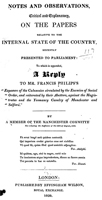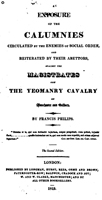
The Peterloo Massacre - Manchester 16th August 1819
TRANSCRIPTION OF : 'NOTES & OBSERVATIONS, Critical & Explanatory, on the Papers Relative to Transcriber's Introduction About the transcription: Why was this publication the one I chose to spend many hours (days!) transcribing, editing, laying out for the web and uploading to the website, when there is so much other material being published this year? The answer is simple - it was written in the weeks following Peterloo by a man sympathetic to reform, and the working man's desperate situation, but definitely not to revolution. He wanted justice, and the truth to be recognised and acknowledged. He was articulate, capable and determined that the local authorities and government would not, 'brush it under the carpet'; shifting the culpability from themselves to a voiceless body of the population; and in the process re-write history in their own favour. The title page of the document does not actually name the author. However, on the Internet Archive download page, authorship is ascribed to John Edward Taylor (but does not offer evidence for this). John Edward Taylor, 1791 - 1844, was brought up in Manchester and present at Peterloo. He was one of the founders of the Manchester Guardian, first printed in 1821. More can be read about him on the 'Spartacus Eductional' website, HERE This document, with the author's comments (in the footnotes), make the point very clearly that it was a peaceable, legal meeting, murderously dispersed, in the first instance, by the Manchester Yeomanry apparently answerable to no-one in military authority. It is available to download as a free .pdf document from the internet (link on every page) but is not as generally well known, as the more popular or accessible resources. For me, this publication, along with the report of the inquest into the death of John Lees (download link on the resources page) gives a clear insight into the attitudes, conspiracy (dare I say?), and attempts to implicate or exonerate, that dominate so many of the accounts. Reading the depositions and letters we can, with the benefit of hindsight, see that, because the authorities were so convinced, and fearful, that revolution was being plotted and was imminent, they needed to find the evidence to prove it. Sadly, it was the reformers' own desire to prove themselves capable of responsibility, and worthy of representation in Parliament, that lit the fuse under the keg of mistrust, fear and panic. The authorities could not, and would not, believe that reform didn't have to go hand-in-hand with revolution ... their 'knee jerk' reaction, to reformers' meetings and attempts on their part to organise themselves properly, was to crush, not conciliate. What can we find in this publication? The title of the document is explicit and self-explanatory. The Dedication is to Henry Grey Bennett, M.P. The Preface, which comes between pages IX and XV explains the reasons, behind the decision to publish these documents and comments, in order that the general public could be made aware of the machinations going on behind the scenes of local and national government. In these pages the author also explains why he feels the need to publicly refute Francis Philips's assertions published in his 'Exposure of the Calumnies Committed ...' Documents under the heading of 'Official Correspondence &c., &c'. start at Page 1 and go up to page 135, although not in strict chronological order. They include frequent, lengthy, explanatory or damning footnotes by the author of 'Notes & Observations ...' who carefully unpicks almost every statement, putting forward his own evidence to show that there was never a desire for revolution or the overthrow of the government on the part of the vast majority of reformers, and that the later, more militant meetings, were as a direct result of the unprovoked attack, by the Yeomanry, on 16th August, on a legal and peaceful assembly. Most of the correspondence had been sent to Lord Sidmouth or, on occasion, to his assistant, H. Hobhouse. There are also letters between various magistrates, boroughreeves and constables, and Peers of the Realm. They are sent from numerous locations, mainly in the north of England and a couple from Scotland. The first document date is from 1st July 1819, from the Manchester & Salford Magistrates, expressing their concern and fear of insurrection and rioting. The following letters are from Birmingham, concerning the proposed meeting to find "means of obtaining the representation of the people of Birmingham in Parliament ..." At the meeting held on 17th July, (page 7) Sir Charles Wolseley was elected to be "Legislatorial Attorney of the people of Brimngham in Parliament ...". the meeting was reported to have dispersed without incident by early evening. More letters from July follow, concerning more proposed meetings and a detailed account of a meeting held on Hunslet Moor, near Leeds on the 19th July, and a record of the 15 resolutions taken (beginning on page 10) Also, from 20th July, is a statement issued from the New Bailey Courthouse, signed by 20 Magistrates recommending the establishment of "armed associations in the towns and surrounding districts for the purpose of strengthening and supporting the Civil Power." (page 15). This letter was followed by more letters from the Yorkshire authorities and on the 24th of July a letter from John Lloyd (Stockport) to Lord Sidmouth with regard to the shooting of 'Birch' after his arrest of 'Harrison' (page 20). Alarmist letters and statements from Manchester, dated from August 5th follow. On page 23 is a "Copy of the Requisition ... to the Boroughreeve and constables" requesting a meeting at the earliest possible date. There is a statement from J.T. Saxton, at the 'Manchester Observer' in which he informs his readers that, after taking legal advice, the wording of the request could possibly be construed as illegal and that the meeting planned for the 9th August should be cancelled. This is followed by numerous statements made on oath about the activities of the workers with regard to the 'drilling of men' on the moors, and letters from the various magistrates etc., - all of which were sent on to Lord Sidmouth. Some were signed with the full name, others anonymously with just the man's initials. On page 53 we can read the panicky letter from J. Norris (Magistrate) to Lord Sidmouth dated 15th August and other letters concerning the situation as they see it and always the most treacherous and violent interpretation they can find. On page 55 the letters and 'sanitised' accounts of the 16th August start to appear. Beginning on page 61 is the letter from Sir John Byng, to Lord Sidmouth, including the report given by Lt. Colonel L'Estrange, who was the senior military officer on the field on the 16th. Many of the letters include depositions by 'spies' or 'informers' concerning the reformers practising drilling, carrying arms etc., and with accounts of pikes being made. There are reports of various reformers' meetings and the resolutions taken at them. All of these emphasise the assumed and imminent danger of revolution and an uprising. The language used is inflammatory and designed to cause alarm ... much seemingly based on exaggerated, even fabricated, evidence. Adjectives used to describe both the reformers' leaders and the working class themselves are abusive and vicious in many instances. More depositions follow ... all damning to the reformers. The panic now seems to have spread as, on p. 67, the Grand Jury of County Palatine of Chester wrote to Lord Sidmouth with their fears, using such terminology as 'dangerous', 'seditious', 'fraud and plunder in their hearts', 'inflammatory', 'under the specious veil of reform, hatred and comtempt for our constitution,' 'visionary claims', 'destructive', 'odious', 'blasphemous', etc., etc. These are sentiments repeated constantly, with variations, in different guises, throughout the statements and letters. The worst possible conclusion is always drawn ... a more reasonable, acceptable outcome is never even considered. There is no differentiation between the individual and the whole working class population ... all are 'tarred with the same brush' and condemned without the opportunity of appeal. On page 73 is a letter dated September 16th, from the Constables at Manchester Police Office, to Lord Sidmouth. The second paragraph begins, "We deem it however our duty to state some of the difficulties with which we have to contend, and which, as they are rapidly increasing, will press heavily ..." The letter, with very lengthy footnotes, extends up to page 79 More letters and statements follow about the drilling, general unrest and the increasing number of meetings, in protest at the events of Peterloo, across the region, Yorkshire and even up to Glasgow. The meetings appear to take on a more verbally aggressive air, with the working men asserting their right to carry a weapon to defend themselves, if attacked, at a peaceful meeting, by the military. The yeomanry and military are frequently mentioned as being on standby or their presence requested by the local authority. On page 100 is found the start of numerous depositions about pikes being made, and carried. On page 105, there is a letter dated 21st October from J.Norris (Manchester magistrate) to Lord Sidmouth, claiming that pikes and pistols are now in the hands of the reformers. There are also accounts of entrapment, as agents buy a pike at a smithy and return later with arrest warrants. There are accounts of more meetings, and the constant expectation of worse to follow. On page 123 in a letter from Thomas Horton, (in Halifax) to H. Hobhouse, he writes "... It does seem to me, however, that a most outrageous breach of the peace was effected last night here. In truth, all we can expect is, that on the next occasion, absolute plunder and destruction of property, and perhaps of life, will be the consequence..." Pages 133 to 135, are a letter from Major General John Byng to Lord Sidmouth, in November 1819, reporting on the fact of meetings across the north of England, within his jurisdiction, or his having independent verification of others). He identifies simultaneous meetings arranged for 1st November, at 15 large towns. Pages 136 to 138 are the author's summing-up, of the then current situation, as he perceived it. 'Reply' and response to Francis Philips's publication, 'Exposure of the Calumnies Circulated by the Enemies of Social Order, and reiterated by their Abetttors, against the Magistrates and the Yeomanry Cavalry of Manchester and Salford' from page 139, up to the end on page 206, can be read the author's, as he again, carefully 'unpicks' almost every statement and offers evidence to the contrary. There is no transcript, by myself, of "Exposure of the Calumnies etc.," as I did not feel that the frequently sychophantic content justified the time that would be spent doing so. However, in the interests of fairness, HERE, again, is the link to a freely downloadable .pdf file of the published document, so that both sides of the argument can be read and judged. ***************************************************************
'NOTES & OBSERVATIONS, Critical & Explanatory, on the Papers Relative to the Internal State of the Country, Recently Presented to Parliament; to which is appended, a REPLY to Mr. Francis Philips's 'Exposure of the Calumnies circulated by the Enemies of Social Order ...' Transcribed by Sheila Goodyear 2019 LINK to full .pdf document of 'Notes & Observations ...'
on the Internet Archive website to read or download. |
||||||||||||||||||||||||||||||||||||||||||||||||||||||

